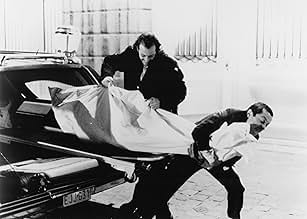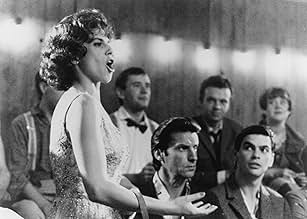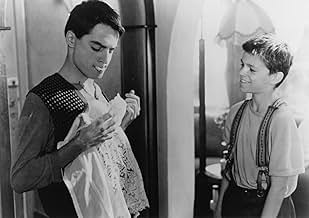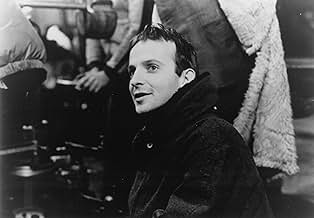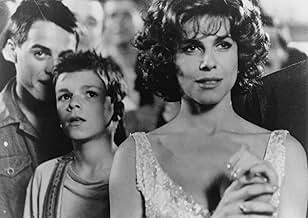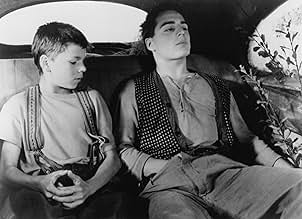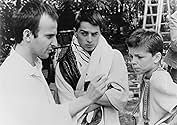PUNTUACIÓN EN IMDb
6,7/10
1,6 mil
TU PUNTUACIÓN
Añade un argumento en tu idiomaHarry Voss' life spans three pivotal days: his carefree youth, high school graduation, and lonely middle age, exploring life's fleeting moments and unfulfilled dreams.Harry Voss' life spans three pivotal days: his carefree youth, high school graduation, and lonely middle age, exploring life's fleeting moments and unfulfilled dreams.Harry Voss' life spans three pivotal days: his carefree youth, high school graduation, and lonely middle age, exploring life's fleeting moments and unfulfilled dreams.
- Dirección
- Guión
- Reparto principal
- Premios
- 7 premios en total
Stanley Duchateau
- Théo
- (as Stan Duchateau)
- …
Reseñas destacadas
LOVE IS A DOG FROM HELL (a.k.a CRAZY LOVE) (Dominique Deruddere - Belgium 1987).
Three Bukowskian tales set in a Belgian, mostly rural, setting. How about that? Despite good reviews upon its release, winning several awards and getting support by Hollywood heavyweights Sean Penn and Francis For Coppola, the film vanished into obscurity almost immediately after its release. Perhaps it was bad timing, because Barbet Schroeder's star-studded BARFLY was released almost simultaneously. Who knows? By any chance, this film is a beauty, clearly deserving wider attention.
The film has a three-act construction, all set around the live of Harry Voss, focusing on his difficult search for love and affection. The first act is set in 1955 and follows Harry when he's twelve years old. He is struck by his first notions of true love when he sees a dream-like film in cinema, only to be helped out of his dream by a more mature friend who claims the only reason people get married is to get laid. Remember, it's fifties' rural Flanders we're talking here. In the second act, in the early sixties, Harry is a shy 19-year old, his face horribly disfigured by a grotesque form of acne. When driving in the bus, he is stared at by all the children, while the adults look away. There's a high school dance, but Harry can't get a girl. In the third act we get a more literal adaptation of Bukowsky's THE COPULATING MERMAID OF VENICE, CA., when Harry is a down-on-his-luck alcoholic, devoid of any aspirations, spending most of his time in shady bars. When he meets an old acquaintance, they go on a joined drinking binch and rehash old memories while patrolling the foggy streets. In their drunken frenzy ("for old time's sake") they decide to steal a body from an ambulance they see on a deserted street and take it to an abandoned house. This makes - how morbid it may sound - for one of the most beautiful and touching scenes of the film. The ending is a beauty.
In the first act the film starts of a bit slowly with some awkward moments. I found the second and third acts the strongest, but all three segments show remarkable cinematic harmony. Beginning and ending the film with nicely contrasted mirror images of "the Princess" running across some dimly lit corridor and Raymond van het Groenewoud's haunting musical theme, it makes for a very neat composition indeed. Cars also feature prominently in all three segments. Most of the key scenes take place in or around cars. It all a very American feel to it, especially the second act. A homecoming dance, a prom, lampoons, American cars, it's small town USA transferred to Belgium. The lead performance by Josse de Pauw who plays the adult Harry in the second and third acts, is a joy to watch.
All the more recommended, because of Mondo Macabro's excellent DVD-release. A bit of an oddity in their usual catalogue of all kinds of exploitational sewers of world cinema (which I often like, don't get me wrong), their treatment of the film is excellent, with a luminous new transfer and jam-packed with extras. Two documentaries, the "making-off" with some great footage of Bukowski and his thoughts on the film, a filmed interview with director Deruddere, a text essay on Flemish cinema, and Mondo Macabro's usual trailer reel of the wilder side of world cinema to top it all off. With an almost surrealist setting and touching subjects like necrophilia, it's not a film most audiences will embrace easily, but any fan of Bukowski, Belgian cinema or good cinema in general should really give this one a try. It might be a far cry from Bukowsky's usual settings but liberal interpretations usually make for far more interesting films. This is worth seeing. Damn, the man even approved of it himself!
Camera Obscura --- 9/10
Three Bukowskian tales set in a Belgian, mostly rural, setting. How about that? Despite good reviews upon its release, winning several awards and getting support by Hollywood heavyweights Sean Penn and Francis For Coppola, the film vanished into obscurity almost immediately after its release. Perhaps it was bad timing, because Barbet Schroeder's star-studded BARFLY was released almost simultaneously. Who knows? By any chance, this film is a beauty, clearly deserving wider attention.
The film has a three-act construction, all set around the live of Harry Voss, focusing on his difficult search for love and affection. The first act is set in 1955 and follows Harry when he's twelve years old. He is struck by his first notions of true love when he sees a dream-like film in cinema, only to be helped out of his dream by a more mature friend who claims the only reason people get married is to get laid. Remember, it's fifties' rural Flanders we're talking here. In the second act, in the early sixties, Harry is a shy 19-year old, his face horribly disfigured by a grotesque form of acne. When driving in the bus, he is stared at by all the children, while the adults look away. There's a high school dance, but Harry can't get a girl. In the third act we get a more literal adaptation of Bukowsky's THE COPULATING MERMAID OF VENICE, CA., when Harry is a down-on-his-luck alcoholic, devoid of any aspirations, spending most of his time in shady bars. When he meets an old acquaintance, they go on a joined drinking binch and rehash old memories while patrolling the foggy streets. In their drunken frenzy ("for old time's sake") they decide to steal a body from an ambulance they see on a deserted street and take it to an abandoned house. This makes - how morbid it may sound - for one of the most beautiful and touching scenes of the film. The ending is a beauty.
In the first act the film starts of a bit slowly with some awkward moments. I found the second and third acts the strongest, but all three segments show remarkable cinematic harmony. Beginning and ending the film with nicely contrasted mirror images of "the Princess" running across some dimly lit corridor and Raymond van het Groenewoud's haunting musical theme, it makes for a very neat composition indeed. Cars also feature prominently in all three segments. Most of the key scenes take place in or around cars. It all a very American feel to it, especially the second act. A homecoming dance, a prom, lampoons, American cars, it's small town USA transferred to Belgium. The lead performance by Josse de Pauw who plays the adult Harry in the second and third acts, is a joy to watch.
All the more recommended, because of Mondo Macabro's excellent DVD-release. A bit of an oddity in their usual catalogue of all kinds of exploitational sewers of world cinema (which I often like, don't get me wrong), their treatment of the film is excellent, with a luminous new transfer and jam-packed with extras. Two documentaries, the "making-off" with some great footage of Bukowski and his thoughts on the film, a filmed interview with director Deruddere, a text essay on Flemish cinema, and Mondo Macabro's usual trailer reel of the wilder side of world cinema to top it all off. With an almost surrealist setting and touching subjects like necrophilia, it's not a film most audiences will embrace easily, but any fan of Bukowski, Belgian cinema or good cinema in general should really give this one a try. It might be a far cry from Bukowsky's usual settings but liberal interpretations usually make for far more interesting films. This is worth seeing. Damn, the man even approved of it himself!
Camera Obscura --- 9/10
I can assure you that Mondo Macabro is truly the wild side of cinema. The flicks these guys dish out are of all levels of genre's. Drama, horror, exploitation, euro, thriller, cult, etc.. Nice tot see someone hand out films that are of quality from all walks of life. Crazy love is all about the other walks of life.
O.K., I can understand growing up in a town way out in Belgium somewhere in 55, attending local cinema and becoming enthralled amongst the gleaming screen of persuasion. I'm talking on a male perspective, sorry ladies. You come running home with the thoughts of kissing, petting and other boner reacting thoughts. You hang out with a next door pal which is a little older and tosses you into the whole scheme of things, of supposed love making. You both fail miserably but on you must go. That I can understand. What I can't understand is how someone could freely talk masturbation when you where such a pre teen, then have your buddy whip it out and throw one back in front of you? I don't think so. The director had that happen, and it was his brother. So maybe it could happen but look where he is from. Well, On to 1962, a few years older and a complexion only a mother could love. You feel really bad, you understand what he going through and he still can't land that lady he most certainly loves.
On to the 70's and by now, you would think he would at least have found Mrs. right? Wrong, still no luck and no a drunken loser. He hooks back up with old time budd and for old times sake. Lets steal a corpse and see what he does. You have to see what true love would do to you.
I thoroughly enjoyed the film, other then the jerk of class I was drenched in emotion. Kind of like an after school special if you will. The director talks a little about the flick and his reasoning. Sure, he knows what he's talking about but when he fessed up to the brother showing brother, or brother watching brother part of his life. I sort of turned the rest off and couldn't get that vision out of my head. A disturbing touch to an already disturbing story. An off the beaten path for this label to come out with but cult is cult and the wild side of cinema needs a home somewhere.
O.K., I can understand growing up in a town way out in Belgium somewhere in 55, attending local cinema and becoming enthralled amongst the gleaming screen of persuasion. I'm talking on a male perspective, sorry ladies. You come running home with the thoughts of kissing, petting and other boner reacting thoughts. You hang out with a next door pal which is a little older and tosses you into the whole scheme of things, of supposed love making. You both fail miserably but on you must go. That I can understand. What I can't understand is how someone could freely talk masturbation when you where such a pre teen, then have your buddy whip it out and throw one back in front of you? I don't think so. The director had that happen, and it was his brother. So maybe it could happen but look where he is from. Well, On to 1962, a few years older and a complexion only a mother could love. You feel really bad, you understand what he going through and he still can't land that lady he most certainly loves.
On to the 70's and by now, you would think he would at least have found Mrs. right? Wrong, still no luck and no a drunken loser. He hooks back up with old time budd and for old times sake. Lets steal a corpse and see what he does. You have to see what true love would do to you.
I thoroughly enjoyed the film, other then the jerk of class I was drenched in emotion. Kind of like an after school special if you will. The director talks a little about the flick and his reasoning. Sure, he knows what he's talking about but when he fessed up to the brother showing brother, or brother watching brother part of his life. I sort of turned the rest off and couldn't get that vision out of my head. A disturbing touch to an already disturbing story. An off the beaten path for this label to come out with but cult is cult and the wild side of cinema needs a home somewhere.
This movie shows the life of Harry Voss, from being a child with a romantic vision of the world to becoming a frustrated alcoholic. Only the third part is based on the short story "The copulating mermaid of Venice, California" by Charles Bukowski. But its development is so intense that it required two other chapters in order to make it even more meaningful. It mixes nice and entertaining images with black, depressing scenes and the end might not be everybody's taste. As one of the songs of the movie puts it, love hurts but it can also kill. Although the film can be funny at times it is mainly sad and it will not leave any spectator indifferent.
Rather effective three part tribute to Charles Bukowsi ( even if the first part is based on the semi autobiographical tale by his author of choice, Joe Fante). The middle section is more predictable than the others and all fairly shocking. The movie mixes music and tempos as well as mood to give just the right bitter sweet flavour with more than a hint of romanticism and drunkenness to give this the authentic air. The attempted initiation of the young boy, the acute acne humiliations and the necrophilia are all hard to take but the film is dressed well enough and a smile lingers despite it all. It also has to be said that the director has managed to convey a real sense of Bukowski's writings/life and that is no small feat in itself.
CRAZY LOVE (Love Is A Dog From Hell) is a romantically disquieting and dismaying film by Flemish director,Dominique Deruddere, and is loosely based on Charles Bukowski's short story, "The Copulating Mermaid From Venice, California". Bukowski is often referred to as, "The Poet Laueate of Skid Row", and all of his work embraces the darker aspects of reality, and this film is certainly no exception. CRAZY LOVE is divided into three parts, and examines the life of the deeply flawed and conflicted individual, Harry Voss. In the first section, we witness Harry at the age of twelve as he begins to intuit the romantic possibilities of Love, and is introduced to the sordid mechanics of sex. And, in the second section, he is a senior in high school who tries to establish some kind of a romantic relationship with the opposite sex while dealing with a disfiguring case of acne. And, in the final section, Harry directly confronts the most perfect manifestation of his sexual and romantic desires. The film is a minor classic of Flemish cinema, and the Netlix disc contains an excellent Bonus Selection which offers an insightful conversation with the director, a short feature on the making of the film, and a brief description of the history of Belgium film-making. CRAZY LOVE is certainly not for everyone, but Bukowski has said that this film comes the closest to capturing the essence of his work.
¿Sabías que...?
- CuriosidadesRegarded by Charles Bukowski as the most successful effort to bring his work to the screen.
- ConexionesReferenced in Film Junk Podcast: Episode 548: Making a Murderer (2016)
Selecciones populares
Inicia sesión para calificar y añadir a tu lista para recibir recomendaciones personalizadas
- How long is Crazy Love?Con tecnología de Alexa
Detalles
Taquilla
- Recaudación en Estados Unidos y Canadá
- 119.919 US$
Contribuir a esta página
Sugerir un cambio o añadir el contenido que falta



